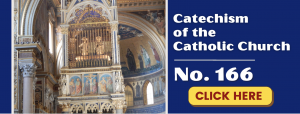Thirty-third Sunday in Ordinary Time

“For greater things you were born.” (Ven. Mother Luisita)
SUNDAY, NOVEMBER 15TH Mt. 25: 14-30 “His master said to him, ‘Well done, my good and faithful servant. Since you were faithful in small matters, I will give you great responsibilities. Come, share your master’s joy!’”
Part 1: Parable of the Talents… by Pope Francis
Part 2: FAITH THAT CAN MOVE THE MOUNTAINS By Fr. Ed Broom, OMV
PART 1: Parable of the Talents… by Pope Francis
This man in the parable represents Jesus, we are the servants, and the talents are the inheritance that the Lord entrusts to us. What is the inheritance? His Word, the Eucharist, faith in the heavenly Father, His forgiveness…in other words, so many things, His most precious treasures.
This is the inheritance that He entrusts to us, not only to safeguard, but to make fruitful! While in common usage the term “talent” indicates a pronounced individual quality, for example talent in music, in sports, and so on, in the parable, talents represent the riches of the Lord which He entrusts to us so that we make them bear fruit.
This parable urges us not to conceal our faith and our belonging to Christ, not to bury the Word of the Gospel, but to let it circulate in our life, in our relationships, in concrete situations, as a strength which galvanizes, which purifies, which renews.
Similarly, the forgiveness, which the Lord grants us particularly in the Sacrament of Reconciliation: let us not keep it closed within ourselves, but allow it to emit its power, which brings down the walls that our egotism has raised, which enables us to take the first step in strained relationships, to resume the dialogue where there is no longer communication. And so forth.
Allow these talents, these gifts, these presents that the Lord has given us, to be, to grow, to bear fruit for others with our witness. Moreover, the Lord does not give the same things to everyone in the same way: He knows us personally and entrusts us with what is right for us; but in everyone, in all, there is something equal: God’s same immense trust. God trusts us, God has hope in us! And this is the same for everyone. Let us not disappoint Him! Let us not be misled by fear, but let us reciprocate trust with trust!
The Blessed Virgin Mary embodied this attitude in the fullest and most beautiful way. She received and welcomed the most sublime gift, Jesus Himself, and in turn she offered Him to mankind with a generous heart. Let us ask Mary to help us to be good and faithful servants in order to participate in the joy of our Lord. END
PART 2: FAITH THAT CAN MOVE THE MOUNTAINS by Fr. Ed Broom, OMV
A both charming and captivating movie that came out about five years ago was that of Little Boy. One of the most memorable and impressive scenes was when the Little Boy was confronted with a miracle situation in which the mountain had to be moved. Indeed, Jesus Himself said faith can move the mountains. With fervor, enthusiasm, and all of the energy in his soul, Little Boy beckoned for the moving of the mountain and in fact the mountain really did move, to the surprise and shock of all except Little Boy. The words of Jesus ring true: “If you have faith as small as a mustard seed, you can say to this mountain, ‘Move from here to there,’ and it will move.” (Mt 17:20) Or, “If you have faith as small as a mustard seed, you can say to this mulberry tree, ‘Be uprooted and planted in the sea,’ and it will obey you.” (Mk 17:6)
This being the case, let us talk about the virtue of faith, what it is, where it comes from, how can we cultivate the virtue of faith and be like Little Boy, able to move the mountains and uproot and transplant the trees.
1. DEFINITION OF FAITH. One of the simplest ways of defining faith is the following: “To believe in a God whom we do not see and trust in His Word.” Jesus gently rebuked Saint Thomas and he was given the nickname Doubting Thomas, because he refused to believe the other Apostles when they reported Jesus had risen and appeared to them. The Lord gently upbraided the apostle with these words: “Thomas, blessed are those who believe without seeing.” With this response, Thomas offers to us, and to the world at large, one of the most simple and profound professions of faith: “My Lord and my God.”
2. ORIGIN OF FAITH. Faith is one of the three theological virtues that with Hope and Charity was planted in the very depths of your soul in the moment of Baptism. When you were baptized by the priest, deacon, or Bishop, using the Trinitarian formula: “(Name), I baptize you in the name of the Father, and of the Son, and of the Holy Spirit,” not only was Original Sin wiped clean from your soul, and not only did you become a living Temple of the Holy Spirit, but you also received these three very special Gifts, the theological virtues of Faith, Hope, and Charity.
3. FAITH COMPARED TO A SEED PLANTED IN A GARDEN. One of the best images for understanding the dynamic process of growth necessary for the virtue of Faith is that of a seed planted in a garden. It could be the best seed in the world. However, if that seed is not cultivated carefully and constantly then that seed can wither up and die. So it is with the virtue of Faith: it must be cultivated or it too can wither up and die!
4. FAITH MUST BE PRACTICED. Not only must the virtue of Faith be cultivated, but it also must be put into practice. A weight-lifter, a baseball player, a swimmer, a runner—all of these athletes might potentially be the best in their field. However, if they do not practice, then they will never really know nor exhibit the talents they have been endowed with. This short saying resounds as true: “Practice makes perfect.” The younger generation has coined this one-liner: “If you don’t use it, you lose it.” The following will be practical ways that we can cultivate and grow in our faith by making concrete acts of faith.
5. PRAYER. The saint Jesuit-Theologian, who died in the year 2000 and is already a Servant of God, Father John Hardon, made this acute observation related to prayer and faith or the loss of faith. He asserted that it was his observation that almost always, those people who abandoned the practice of prayer, who abandoned this essential practice, at the same time lost their faith. It stands to reason because every time we pray, we are making an act of faith, we are talking to a God who is invisible, whom we cannot see with our physical sense of sight.
6. THE SIGN OF THE CROSS. Another key act of faith is when we make the Sign of the Cross, saying the words: “In the name of the Father, and of the Son, and of the Holy Spirit. Amen.” This gesture and these words express our faith in the most profound Mystery of the Catholic Faith, the Blessed Trinity, that we believe in one God and Three Persons—the Father, the Son, and the Holy Spirit.
7. GENUFLECTION. Another key corporal act of faith is that of genuflection, in which your right knee touches the ground every time you walk in front of the Blessed Sacrament. Your faith is directed toward The Mystery of Faith that is Jesus truly present in His Body, Blood, Soul, and Divinity in the most Holy Sacrament of the altar.
8. BOWING UPON HEARING THE NAME OF JESUS. Saint Paul says: “Because of this, God greatly exalted him and bestowed on him the name above every name, that at the name of Jesus every knee should bend, of those in heaven and on earth and under earth, and every tongue confess that Jesus Christ is Lord to the glory of God the Father.” (Phil 2:9-11) These words of the great Apostle Saint Paul express the greatness of the Person and the Name of Jesus. Therefore, we should form that habit of bowing our head upon hearing the Name of Jesus. By doing so, our faith will be bolstered.
9. TRIALS SENT BY GOD. Like Abraham, like Peter and the Apostles, like the Blessed Virgin Mary and the saints, our faith has to be tested, purified, and perfected by means of many trials. Saint James expressed this truth in these words: “Consider it all joy, my brothers, when you encounter various trials, for you know that the testing of your faith produces perseverance. And let perseverance be perfect, so that you may be perfect and complete, lacking in nothing.” (Jas 1:2-4). God must send us trials in one form or another so as to purify, to strengthen, and to fortify our faith. As rusty iron is purified and perfected in the crucible of fire, so our faith is perfected by various forms and sorts of trials. The episode of Peter, first walking and then sinking in the waves, in which he cried out: “Lord, save me” elicited these words and gesture of Jesus: “‘Man of little faith, why did you doubt?’ and Jesus reached out His hand and grabbed on to that of Peter.” (Mt 14:30-31) Then Peter walked on water again! Like Peter, at times we are called to leave the comfort zone of our boat and walk on the cold, rolling, and uncertain waters, all the while placing our faith and trust totally in the Lord Jesus.
10. SHARE YOUR FAITH WITH OTHERS. In a material way, when we give something away we become impoverished. Not so when we share our faith. By sharing our faith in Jesus, in God, in the Catholic Church, we grow, and the more we generously share, the greater growth we will experience! Saint Paul reminds us: “There is more joy in giving then in receiving.” Share your faith and you will grow in your faith!
Let us beg Our Lady, who never lost her faith and total trust in God, even in the most difficult times in her life, that she would pray fervently for us so that like Little Boy our faith will be so strong that we will be able to move the highest mountains. Holy Mary, Mother of God, pray for us sinners now and at the hour of our death. Amen.
Copyright 2020 Oblates of the Virgin Mary
St. Peter Chanel Church, Hawaiian Gardens, CA

